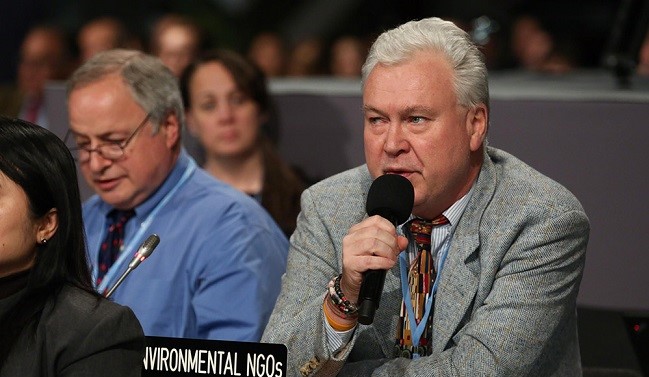On the eve of the Special Report on Climate Change and Land by the Intergovernmental Panel on Climate Change (IPCC), Climate Action Network (CAN) members have called on governments to urgently incorporate policies and lock commitments that halt deforestation, drive sustainable use of land, protect forests, restore ecosystems, and secure land property rights for small scale farmers and indigenous communities.

Members emphasised these actions as well over one-third of the solution to the climate crisis and can close the mitigation gap to keep warming below 1.5°C, complementing decarbonisation through the just transition from fossil fuels to renewable energy.
The report, which will be released on Friday, August 8, 2019 is expected to add weight to the existing science and findings from the IPCC Special Report on Global Warming of 1.5°C released last year and the IPBES Global Assessment Report on Biodiversity and Ecosystem Services from earlier this year.
CAN members called on governments and other actors to leverage the report as the first from IPCC to look at the relationship between climate change and land to drive consensus on food and land use systems, which is still lagging behind energy transition as an acknowledged response to the climate emergency.
CAN members also emphasised the dual role of land and ecosystems in acting as carbon sinks and sources of emissions whereby the necessity to keep them intact and avoid converting forests and other carbon-rich ecosystems into industrial agricultural systems.
The panelists also warned against the expansion of monocultures such as soy which is causing the destruction of an area the size of Switzerland every two years only to feed animals driven by global meat consumption, whereby the necessity to enforce transformative changes that include modifications in dietary practices. CAN members said that agriculture and food systems are responsible for over 30% of greenhouse gas emissions.
The CO2 sequestered by monocultures is very vulnerable to losses by drought, heat, storms and insect outbreaks. By contrast, the restoration of native forests and other carbon-rich ecosystems on the same areas is beneficial for biodiversity, reduces land degradation and water shortage. Restoration helps in adapting to climate change and sequesters large amounts of CO2 in a way that is much more robust against drought, heat and other mounting weather extremes.
Stephan Singer, Senior Advisor Global Energy Policies, Climate Action Network International, said: “CAN urges governments resulting from the IPCC report to immediately stop all destruction of forests and ecosystems, invest in restoration of nature and secure land property rights for small scale farmers. CAN demands strong legislation to overcome the 30% of food waste globally and reverse the growth of large-scale industrialised farming particularly based on beef production that causes deforestation and significant GHG emissions in many countries.”
Beatriz Luraschi, Principal Policy Officer-International, Royal Society for the Protection of Birds, UK: “We hope that this landmark report will confirm human activities on land are a huge driver of emissions. However, we could turn this problem into a solution. If we were to halt the loss of carbon- and nature-rich ecosystems, empower indigenous communities to manage their land and if we transformed our agricultural and food systems, not only would we stand a much better chance of addressing the climate crisis, but we would at once enhance our food security, our health, and we would be able to give all other life on earth the chance to thrive.”
Doreen Stabinsky, Professor, Global Environmental Politics, College of the Atlantic, Bar Harbor, Maine, US: “Climate change poses enormous threats to our ability to feed ourselves. The poorest and most vulnerable are currently on the frontlines of climate impacts on food production, and already many across the world are migrating from their homes in order to be able to feed their families.
“These are warning signals that all of us ignore at our peril, for agriculture ultimately is one of the most threatened of our economic sectors and most fundamental for the healthy functioning of our societies and our communities. This report should begin to make clear how serious a threat this is, not in 2100 but in our lifetimes – in the coming decades.”
Christoph Thies, Global Forest and Climate Expert, Greenpeace, Germany: “This report comes at a critical juncture for our society and must be met with rapid government and business action to protect our forests and climate from destruction. Countries must urgently reduce emissions from land, especially from deforestation, and increase the uptake of carbon by restoring forests through lower logging rates and natural regeneration other carbon-rich ecosystems.
“Land use and natural climate solutions need to be taken much more seriously because both rapid decarbonisation and nature-based land-use solutions will be needed to limit warming to 1.5C. Our forests are our future. Without them we face the prospect of runaway climate change.”
Stephen Cornelius, Chief Advisor on Climate Change, World Wildlife Fund for Nature (WWF): “Land is both a source and a sink of carbon emissions. Good land-use choices are central to tackling the climate crisis. Unfortunately, our current agriculture, forestry, and other land uses are part of the problem as they contribute between a fifth and a quarter of global greenhouse gas emissions.
“We must see a rapid shift in how we manage our land, alongside the necessary deep cuts to fossil fuel emissions, if we are to meet the 1.5°C goal of the Paris Agreement. A system-wide move to sustainable land management and nature-based solutions is critical to securing a climate-safe future, while also contributing to other societal goals, such as halting nature loss and delivering food security.”
